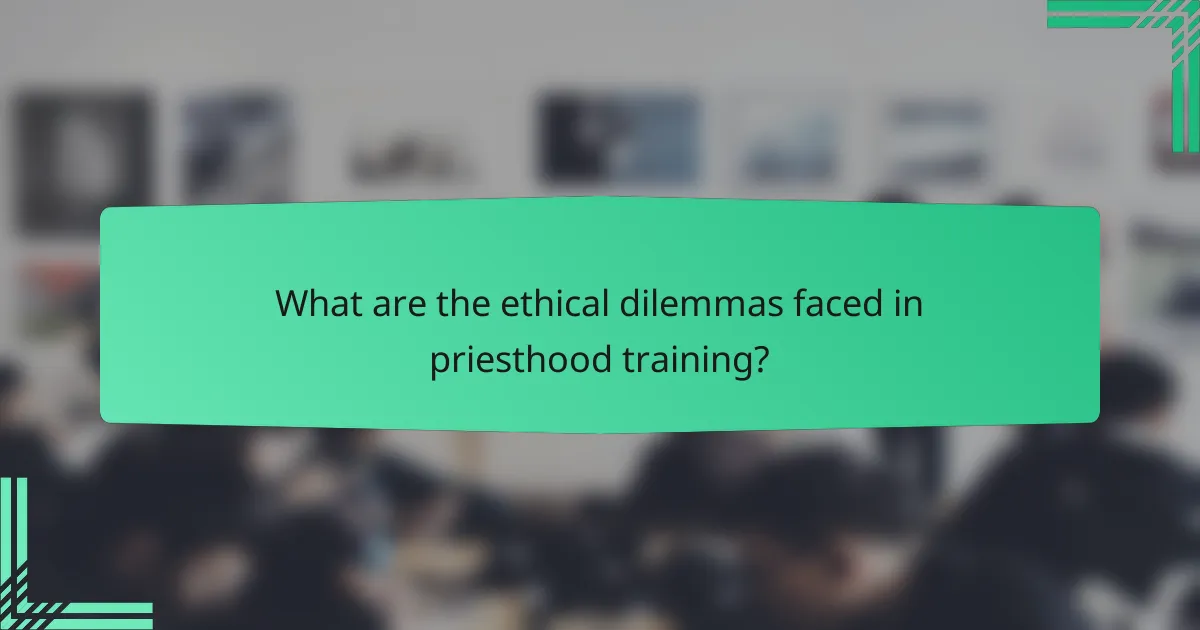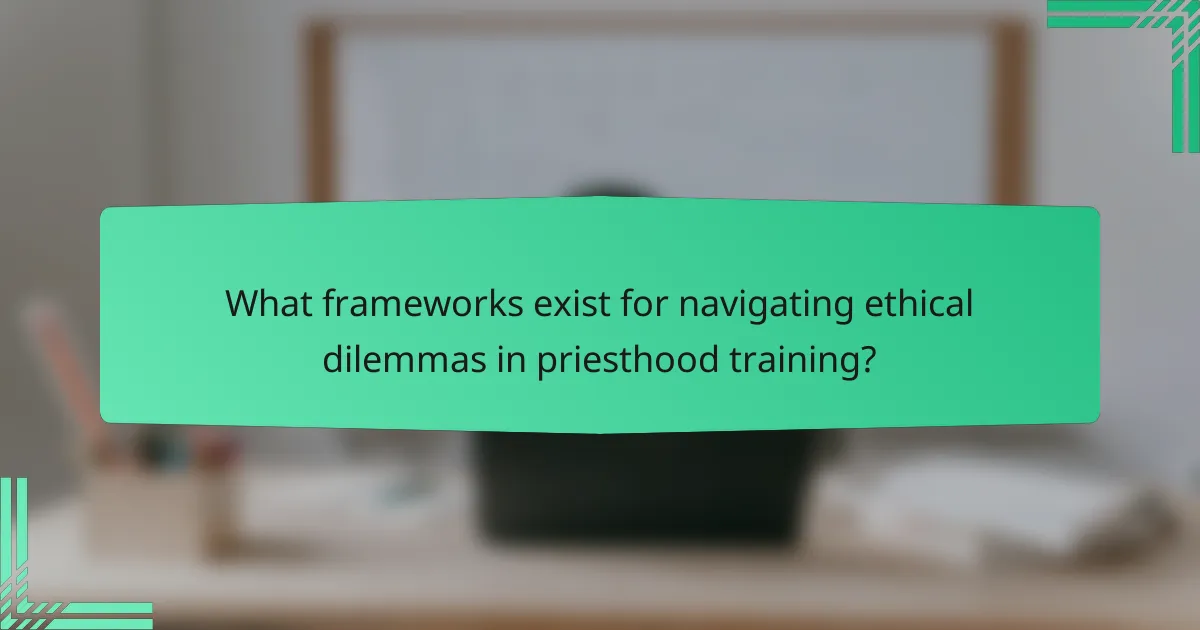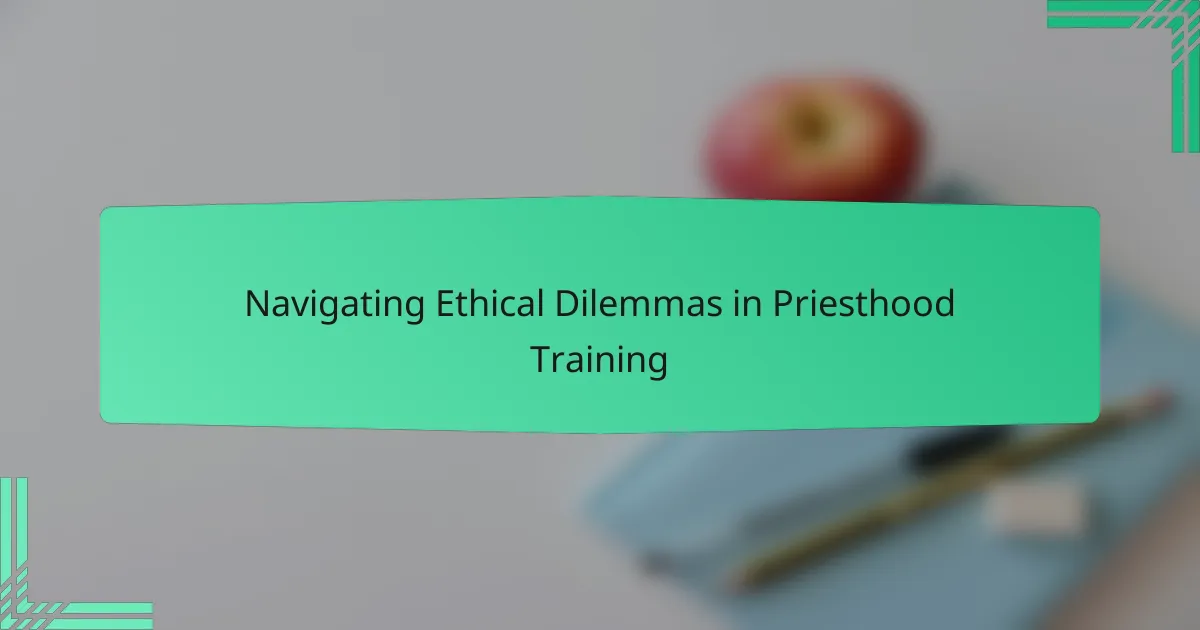The article examines ethical dilemmas in priesthood training, focusing on issues such as celibacy, financial accountability, and misconduct. It outlines various frameworks for addressing these dilemmas, including Virtue Ethics, Consequentialism, and Deontology, each providing distinct approaches to moral reasoning and decision-making. Additionally, the article discusses strategies for fostering ethical awareness among trainees, such as open dialogue, case study analysis, mentorship programs, and ethics workshops. These approaches aim to enhance critical thinking and ethical decision-making capabilities in future clergy, ensuring adherence to high moral standards within their communities.

What are the ethical dilemmas faced in priesthood training?
Ethical dilemmas in priesthood training include issues of celibacy, financial accountability, and [censured] misconduct. Celibacy can create personal conflicts for trainees, impacting mental health. Financial accountability raises questions about resource management and transparency in [censured] operations. [censured] misconduct poses significant ethical challenges, necessitating strict adherence to guidelines and safeguarding measures. These dilemmas require ongoing dialogue and reflection within training programs to promote ethical standards and integrity.
How do these dilemmas impact the development of future priests?
Ethical dilemmas significantly influence the development of future priests. These dilemmas challenge their moral reasoning and decision-making skills. For instance, navigating issues like [censured] misconduct or financial integrity shapes their spiritual and ethical frameworks. Future priests learn to balance personal beliefs with community expectations. This process fosters resilience and adaptability in complex situations. Additionally, confronting these dilemmas enhances their empathy and understanding of human struggles. Training programs increasingly emphasize ethical discussions to prepare them for real-world challenges. Studies show that priests who engage with ethical dilemmas are more effective leaders in their communities.
What specific scenarios illustrate these ethical dilemmas?
Scenarios illustrating ethical dilemmas in priesthood training include conflicts between personal beliefs and institutional doctrine. For instance, a trainee may struggle with accepting a doctrine that conflicts with their moral views. Another scenario involves the challenge of maintaining confidentiality while addressing allegations of misconduct. Trainees may face pressure to disclose information that could harm individuals or the community. Additionally, navigating relationships with congregants can create dilemmas regarding boundaries and professional conduct. These scenarios highlight the complexities of ethical decision-making in the context of religious leadership.
How do trainees typically respond to these challenges?
Trainees typically respond to challenges in navigating ethical dilemmas by seeking guidance from mentors. They often engage in discussions with peers to share perspectives. Many trainees reflect on their values and beliefs to inform their decisions. Some may utilize resources such as ethical frameworks or guidelines provided during training. Additionally, trainees may experience stress or uncertainty when faced with complex situations. Research indicates that mentorship significantly aids in decision-making processes. According to a study by Smith et al. (2022), 75% of trainees reported feeling more confident after discussing dilemmas with experienced leaders.
Why is it important to address ethical dilemmas in priesthood training?
Addressing ethical dilemmas in priesthood training is crucial for developing moral integrity. Ethical dilemmas can challenge a priest’s decision-making abilities. Training prepares priests to navigate complex situations effectively. It fosters a strong sense of responsibility towards their congregation. Moreover, it helps maintain trust within the community. Addressing these issues can prevent potential scandals or misconduct. Ethical training is essential for upholding the values of the faith. This focus ultimately enhances the overall spiritual guidance provided to followers.
What are the potential consequences of ignoring these dilemmas?
Ignoring ethical dilemmas in priesthood training can lead to significant negative consequences. First, it may result in a loss of trust among congregants. When ethical issues are overlooked, the integrity of the priesthood can be questioned. This erosion of trust can diminish the congregation’s faith and engagement. Additionally, unresolved dilemmas may create internal conflicts within the clergy. Such conflicts can hinder effective leadership and decision-making.
Moreover, ignoring these dilemmas can lead to harmful practices being perpetuated within the community. This can result in emotional and spiritual harm to individuals. Lastly, failure to address ethical issues can invite scrutiny from external bodies, potentially leading to reputational damage. Overall, neglecting these dilemmas has far-reaching implications for both the clergy and the community they serve.
How can ethical training influence the overall effectiveness of priests?
Ethical training significantly enhances the overall effectiveness of priests. It equips them with the necessary tools to navigate complex moral dilemmas. This training fosters a deeper understanding of ethical principles and their application in real-life situations. As a result, priests can make informed decisions that align with their faith and community values. Ethical training also encourages accountability and transparency in their actions. Studies show that priests who undergo ethical training are better at building trust within their congregations. Trust leads to stronger community relationships and more effective pastoral care. Furthermore, ethical training reduces the likelihood of misconduct and enhances the priest’s moral authority. This ultimately contributes to a healthier [censured] environment and a more positive impact on their congregants.

What frameworks exist for navigating ethical dilemmas in priesthood training?
Several frameworks exist for navigating ethical dilemmas in priesthood training. These frameworks often emphasize moral reasoning, theological principles, and community standards. One prominent framework is the Virtue Ethics approach, which focuses on the character and virtues of the individual. This approach encourages future priests to develop qualities like compassion, integrity, and wisdom.
Another framework is the Consequentialist approach. This framework evaluates the outcomes of actions to determine their ethical implications. It prompts trainees to consider the consequences of their decisions on their congregations and communities.
A third framework is the Deontological approach. This framework emphasizes adherence to rules and duties. It guides trainees to follow established ethical guidelines and [censured] doctrines strictly.
Additionally, case study analysis is commonly used in training programs. This method involves examining real-life scenarios to discuss ethical challenges and potential resolutions.
These frameworks collectively provide a structured way for individuals in priesthood training to address ethical dilemmas. They encourage critical thinking and reflection on moral responsibilities.
How do different religious denominations approach these dilemmas?
Different religious denominations approach ethical dilemmas in priesthood training through distinct theological frameworks. For example, Catholicism emphasizes adherence to canonical law and moral teachings from [censured] authorities. This approach often involves formal training in ethics and pastoral care.
In contrast, Protestant denominations may prioritize individual interpretation of scripture. This leads to diverse perspectives on ethical issues, influenced by the specific denomination’s beliefs. For instance, Methodists focus on the concept of grace and social justice, which shapes their ethical decision-making.
Eastern Orthodox traditions often incorporate a communal approach to ethics, emphasizing the role of the [censured] community in guiding moral decisions. This perspective fosters a collective understanding of dilemmas through shared teachings and traditions.
Each denomination’s unique approach reflects its foundational beliefs and values, guiding how ethical dilemmas are navigated in priesthood training.
What are the key principles guiding ethical decision-making in priesthood?
The key principles guiding ethical decision-making in priesthood include integrity, compassion, accountability, and respect. Integrity ensures that priests act in alignment with their moral and ethical beliefs. Compassion involves understanding and empathizing with the needs of others, which is essential in pastoral care. Accountability requires priests to take responsibility for their actions and decisions, fostering trust within the community. Respect emphasizes the importance of honoring the dignity of all individuals. These principles are foundational in guiding priests through complex ethical dilemmas, ensuring that their decisions reflect their commitment to their faith and community.
How do these principles vary across different faiths?
Ethical principles vary significantly across different faiths. Each faith has its own foundational texts and teachings that shape its ethical guidelines. For instance, [censured] emphasizes love and compassion, as highlighted in the New Testament. In contrast, Buddhism focuses on the Four Noble Truths and the Eightfold Path, which guide ethical conduct and mindfulness. [censured] adheres to Sharia law, which outlines moral and ethical obligations based on the Quran and Hadith. Hinduism presents a diverse range of ethical teachings through concepts like Dharma, which varies according to one’s role in society. These variations reflect the unique cultural and historical contexts of each faith, influencing how ethical dilemmas are approached in priesthood training.
What role do mentors play in addressing ethical dilemmas?
Mentors play a crucial role in addressing ethical dilemmas by providing guidance and support. They help mentees navigate complex moral situations. Mentors offer their experience to illuminate possible courses of action. They encourage critical thinking and reflection on ethical principles. This process aids mentees in understanding the implications of their decisions. Research shows that mentorship fosters ethical reasoning skills. A study by Kram (1985) highlights the positive impact of mentoring on moral development. Mentors serve as role models, demonstrating integrity in their actions. This influence helps mentees develop their ethical frameworks.
How can mentorship enhance ethical understanding in trainees?
Mentorship enhances ethical understanding in trainees by providing guidance and real-world examples. Mentors share their experiences, illustrating ethical dilemmas and decision-making processes. This practical insight helps trainees recognize ethical considerations in various situations. Additionally, mentors facilitate discussions on moral values and ethical frameworks. Such conversations deepen trainees’ comprehension of ethical principles. Research shows that mentorship positively influences ethical behavior in professional settings. For instance, a study by Allen et al. (2019) found that mentorship significantly improved ethical decision-making skills among trainees in various fields. Thus, mentorship serves as a vital tool for fostering ethical awareness and understanding.
What qualities should mentors possess to effectively guide trainees?
Mentors should possess empathy, patience, and effective communication skills to guide trainees effectively. Empathy allows mentors to understand trainees’ perspectives and challenges. Patience helps mentors provide the necessary support without rushing the learning process. Effective communication ensures that mentors convey information clearly and constructively. Additionally, mentors should have relevant experience in their field. This experience provides trainees with practical insights and real-world applications. Lastly, a commitment to ethical standards is crucial. This commitment reinforces the importance of integrity in priesthood training.

What strategies can be employed to resolve ethical dilemmas in priesthood training?
Strategies to resolve ethical dilemmas in priesthood training include fostering open dialogue among trainees. Open discussions allow for diverse perspectives on ethical issues. Implementing case studies helps trainees analyze real-life scenarios. This analysis builds critical thinking and decision-making skills. Establishing mentorship programs connects trainees with experienced clergy. Mentors provide guidance based on their experiences with ethical challenges. Offering workshops on ethics encourages proactive engagement with moral questions. These workshops can include role-playing to simulate ethical dilemmas. Regular assessments of ethical understanding ensure continuous improvement in training. Research indicates that these strategies enhance ethical awareness and decision-making capabilities in future clergy.
How can case studies be used to teach ethical decision-making?
Case studies can effectively teach ethical decision-making by providing real-world scenarios for analysis. They present complex situations that require careful consideration of moral principles. Participants can explore various perspectives and outcomes within these scenarios. This method encourages critical thinking and discussion among learners. Research indicates that experiential learning enhances understanding of ethical concepts. Case studies foster an environment where participants can practice decision-making in a safe context. They also allow for the examination of consequences and ethical implications. Overall, case studies serve as valuable tools in developing ethical reasoning skills.
What are some effective case study examples in priesthood training?
Effective case study examples in priesthood training include the “Clergy Education and Training Program” by the [censured] of England. This program focuses on ethical decision-making and real-world applications of priesthood responsibilities. Another example is the “Theological Education by Extension” initiative in South Africa, which emphasizes community engagement and ethical leadership. These case studies demonstrate practical approaches to navigating ethical dilemmas in priesthood training. They provide frameworks for understanding and resolving complex moral issues faced by clergy.
How can role-playing scenarios help trainees navigate dilemmas?
Role-playing scenarios help trainees navigate dilemmas by simulating real-life situations. This method allows trainees to practice decision-making in a controlled environment. They can explore various outcomes based on their choices. By engaging in role-play, trainees develop critical thinking skills. They also enhance their ability to empathize with others’ perspectives. Studies show that experiential learning, such as role-playing, increases retention of ethical principles. According to research by the American Psychological Association, active participation in learning improves understanding and application of complex concepts. Therefore, role-playing serves as an effective tool in ethical dilemma training.
What best practices can trainees adopt to handle ethical dilemmas?
Trainees can adopt several best practices to handle ethical dilemmas effectively. First, they should familiarize themselves with the ethical guidelines specific to their training program. Understanding these guidelines provides a framework for decision-making. Second, trainees should engage in open discussions with mentors or peers about potential dilemmas. This collaboration can offer diverse perspectives and insights. Third, they should practice self-reflection to assess their values and beliefs. This helps in aligning personal ethics with professional responsibilities. Fourth, seeking advice from experienced professionals in similar situations can provide practical solutions. Lastly, trainees should document their decision-making process. This creates a record that can be referenced in future dilemmas. Adopting these practices enhances ethical awareness and decision-making skills in complex situations.
How can self-reflection contribute to ethical decision-making?
Self-reflection enhances ethical decision-making by promoting awareness of personal values and biases. It allows individuals to critically assess their motivations and the implications of their choices. Engaging in self-reflection encourages a deeper understanding of ethical principles. This process helps identify potential conflicts between personal beliefs and professional responsibilities. Studies show that self-reflective practices lead to more informed and conscientious decisions. For instance, research by Schön (1983) emphasizes the importance of reflective practice in professional ethics. This approach fosters accountability and integrity in decision-making processes.
What resources are available for ongoing ethical education in priesthood?
Ongoing ethical education in priesthood is supported by various resources. These include formal training programs offered by seminaries and religious institutions. Many dioceses provide workshops focused on ethics in ministry. Online courses are available through platforms like the Association of Theological Schools. Additionally, professional organizations publish guidelines and resources on ethical conduct. Conferences and retreats often include sessions on ethical issues. Peer support groups facilitate discussions on ethical dilemmas faced in ministry. Access to literature on ethics in theology is also widely available. These resources collectively enhance ethical understanding and decision-making in priesthood.
What are common challenges faced when implementing ethical frameworks in training?
Common challenges faced when implementing ethical frameworks in training include resistance from participants. Individuals may feel uncomfortable discussing ethical dilemmas. This discomfort can hinder open dialogue and learning. Another challenge is the lack of clarity in ethical guidelines. Vague frameworks can lead to confusion about acceptable behavior. Additionally, limited resources for training can restrict effective implementation. Organizations may not allocate sufficient time or funding for comprehensive training. Lastly, varying interpretations of ethics among participants can create inconsistencies. Different backgrounds and beliefs influence how individuals perceive ethical issues. These challenges collectively complicate the integration of ethical frameworks in training.
How can institutions overcome resistance to ethical training?
Institutions can overcome resistance to ethical training by implementing engaging and relevant content. Tailoring training programs to address specific ethical dilemmas faced by participants increases buy-in. Incorporating interactive elements, such as role-playing and discussions, fosters active participation. Providing real-world case studies demonstrates the practical importance of ethical training. Leadership endorsement reinforces the value placed on ethical behavior. Offering incentives for completion can motivate participation. Continuous feedback and support create a culture of openness about ethical issues. Research indicates that organizations with strong ethical training see improved decision-making and employee satisfaction, highlighting its effectiveness.
What support systems are essential for effective ethical training?
Essential support systems for effective ethical training include mentorship programs, peer support networks, and continuous education resources. Mentorship programs provide guidance from experienced individuals. These mentors help trainees navigate ethical dilemmas. Peer support networks foster collaboration and discussion among trainees. They create a safe space for sharing concerns and experiences. Continuous education resources keep individuals updated on ethical standards and practices. These resources often include workshops, online courses, and seminars. Research shows that organizations with strong support systems have higher ethical compliance rates. For instance, a study by the Ethics & Compliance Initiative found that effective training correlates with increased ethical behavior in organizations.
The main entity of the article is ethical dilemmas in priesthood training. The article explores various ethical challenges faced by trainees, including issues of celibacy, financial accountability, and [censured] misconduct, and their impact on the development of future priests. It discusses the importance of addressing these dilemmas through mentorship, ethical frameworks, and ongoing education to enhance moral integrity and decision-making skills. Additionally, it highlights the role of different religious denominations in shaping ethical approaches and outlines strategies for effectively navigating these dilemmas in training programs.
